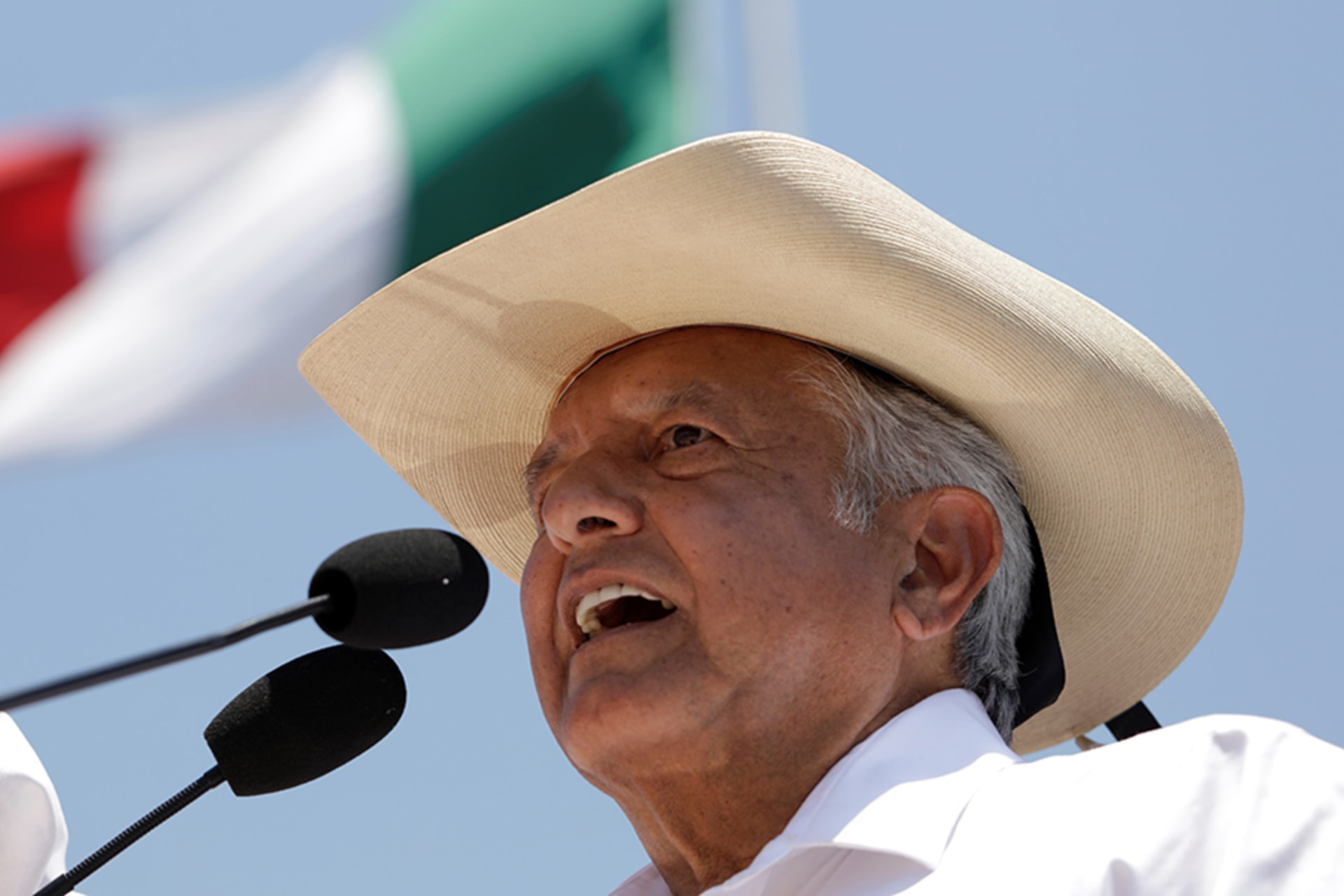Is Political Change Coming to Mexico?
Andres Manuel Lopez Obrador will likely become Mexico’s next president at a time of mounting concern over corruption and violence, but his reform plans are hazy.

By experts and staff
- Published
Experts
![]() By Shannon K. O'NeilSenior Vice President of Studies and Maurice R. Greenberg Chair
By Shannon K. O'NeilSenior Vice President of Studies and Maurice R. Greenberg Chair
By
- Rocio Cara LabradorEditorial Associate
Voters in Mexico will cast ballots on July 1 for a new president and more than six hundred congressional seats with hopes of halting unprecedented levels of violence, worsening corruption, and economic malaise. Frontrunner Andres Manuel Lopez Obrador (AMLO) has promised to create a multiparty coalition to address these grievances amid widespread skepticism from his political opponents, the business sector, and civil society alike, says CFR’s Shannon O’Neil in a written interview. He can also be expected to push back more energetically than President Enrique Pena Nieto against policies of and perceived slights by the Trump administration, she says.
What are the top issues for Mexicans in the upcoming general election?
Mexicans head to the polls motivated largely by anger—over corruption, a record twenty-nine thousand murders last year, and the limited economic opportunities so many face. For some twelve million, this will be their first opportunity to express their voice through the ballot box.
AMLO holds a double-digit lead in the polls. What is his platform, and to whom does it appeal?
In his third campaign for president, AMLO has moved somewhat away from the combative stance of his earlier campaigns and surrounded himself with surrogates who espouse a range of ways that his administration could govern. He has uncharacteristically reached out across party and ideological lines, giving rise to odd bedfellows: former cabinet members of the storied Institutional Revolutionary Party (PRI) [in power for seventy-seven of the last one hundred years] alongside loyalists to the progressive National Regeneration Movement (MORENA), as well as left-wing Workers’ Party activists together with socially conservative Social Encounter Party members.
These conciliatory actions paint a more inclusive and market friendly version of the candidate. Still, AMLO himself has remained consistent on substance, calling for more state involvement in the economy, taking a hard line against his critics, and maintaining an expansive view of presidential powers. His promises to fight corruption and insecurity and to address Mexico’s inequality, however vague, have broad appeal.
Who are his main opponents?
AMLO’s main political opponent is Ricardo Anaya, who leads the Frente coalition. The young leader has struggled to shrug off corruption allegations, which many felt were spread by the current government). More generally, disorganization and muddled messages have hampered his campaign.
Meanwhile, Jose Antonio Meade is running as the candidate of the PRI. While the five-time cabinet member is seen as honest and capable, he represents a party rotten to the core, undone in the eyes of voters by corruption scandal after scandal.
AMLO’s likely victory rides in no small part on the shortcomings and outright collapse of his competitors
AMLO’s likely victory rides in no small part on the shortcomings and outright collapse of his competitors rather than on his own political acumen. However, he faces widespread skepticism from the business elite and civil society, both of whom worry about what his presidency might bring.
What could we expect from an AMLO presidency?
Expectations are both high and conflicting. No one knows what he will do. He could be an economic pragmatist, staying true to his promise not to raise debt or taxes. But he has also promised to greatly expand benefits to both the young and old and to nearly double public investment in infrastructure, suggesting a very different financial balance.
While single-mindedly focusing on corruption and violence in his campaign, he has never provided details about how he would address these scourges. Additionally, he has both denigrated and said he would protect the structural reforms of the Enrique Pena Nieto administration, particularly in the energy sector.
One area where there is more certainty is education—he and his supporters inside Mexico’s teachers union have been quite clear that they will pull back the reform efforts of the last few years.
The biggest question involves institutions. Will he abide by the checks and balances within Mexico’s political system and society and work through the messy compromises that democracy requires, or will he work to undermine those opposed to his vision?
The Donald J. Trump administration has threatened to withdraw from the North American Free Trade Agreement (NAFTA), imposed tariffs on Mexican steel and aluminum, and aroused Mexican concerns with so-called zero-tolerance immigration policies. Are U.S.-Mexican relations influencing the presidential race?
The United States has not played a significant role in this race. All of the candidates are opposed to the perceived bullying from the north. But these tensions will undoubtedly continue, requiring a response from the new president and his government.
AMLO is unlikely to be as silent as Pena Nieto in the face of slights and threats. Though AMLO has said he does not plan on confronting Trump directly, he—like Trump—understands the importance of playing to his domestic base. I expect more Twitter battles than we have seen between the two nations’ leaders so far.
This written interview has been edited and condensed.
